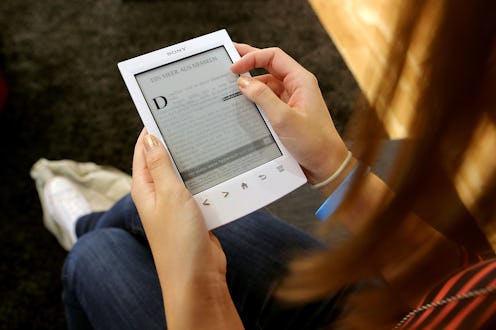Books
Women Authors Dominate This Part of Publishing
At a trade conference Wednesday, Amazon.com divulged that roughly 25 percent of its U.S. Kindle Top 100 list for 2012 was composed of self-published and "indie" authors. According to stats from this year's current list, those numbers don't seem to be budging. This is good news for self-published authors and independent publishing houses across the United States, but the big winner in this news seems to be women authors.
Conference attendee Writer.ly shared the following picture on Twitter:
The stats shown in this visual represent the Kindle Top 100 for 2012. Within these 25 books, nearly half, or 12, are from indie or self-published women writers — 15 if you count E.L. James' three Fifty Shades books, which started with a self-published e-book before it was picked up by Random House. (And, as an aside, women took home the overall top six positions on the list.) Even better for women is that this number seems to have jumped for 2013.
The current (and yes, we still have the majority of December left) Kindle Top 100 for 2013 has 15 books by female, self-published or independent authors, and several more on the fringes — again, not counting the E.L. James novels on the list. According to their ranking:
- No. 20: H.M. Ward, Damaged: The Ferro Family
- No. 21: Elisabeth Naughton, Wait for Me
- No. 27: Tracy Brogan, Crazy Little Thing
- No. 29: J.S. Scott, The Billionaire's Obsession (Boxed Set)
- No. 32: J.C. Reed, Surrender Your Love
- No. 42: Jasinda Wilder, Falling Into You
- No. 50: Abbi Glines, Fallen Too Far
- No. 51: Catherine Ryan Hyde, When I Found You
- No. 54: J.C. Reed, Conquer Your Love
- No. 66: Abbi Glines, Never Too Far
- No. 71: Barbara Freethly, Don't Say a Word
- No. 72: Lisa Renee Jones, Tall, Dark, and Deadly (3 book box set)
- No. 85: Helen Bryan, The Sisterhood
- No. 86: Georgia Cates, Beauty from Pain
- No. 89: H.M. Ward, Damaged 2: The Ferro Family
The majority of these 15 titles are adult contemporary romances, some are erotica, and some are historical romances and thrillers.
Female self-published authors have been making the news since Irma S. Rombauer self-published The Joy of Cooking in 1931, and more recently with authors like E.L. James, Amanda Hocking, and Beth Reeks (pen name Beth Reekles).
We all know who E.L. James is by now, especially with the near-daily Fifty Shades of Grey movie news.
Hocking writes YA paranormal romances, and she had written 17 of them and self-published them as e-books before she was picked up by a trade publisher. In 2011 the Toronto Star reported that Hocking sold 900,000 copies of her books and was making $2 million a year.
Beth Reeks, who self-published three YA romance novels during her time at Exeter University, was named to Time's 16 Most Influential Teenagers of 2013 — alongside Justin Bieber and Lorde.
The story behind many of these female (and male) writers echos the idea that traditional publishing houses didn't have the budget, or the interest, to bring them on board. And with rejection after rejection, they turned to self-publishing. However, success brings clout, and self- and indie-publishing is gaining steam as a first-choice option for women writers, particularly in the romance category.
In an interview with The Guardian, Reeks discussed her experience as a teenager publishing online:
"When I started writing I had no friends who were writers and so I thought it was a strange hobby. Then I found an online community of other girls who liked writing and that was a big confidence booster for me. I felt, okay, this is something that is not that strange, it's just uncommon."
"There tend to be a lot of negative stories about teenagers on the internet but it is a good place to show your talent off," Reeks added. "Publishers are finding a lot of people online now."
Another successful self-published author is Aubrey Rose, who recently turned down a publishing contract from Amazon, saying she could make a better living on her own.
While of course Amazon's definition of 'indie' is broad — essentially meaning 'not from the biggest publishing houses' — this news is still an indicator of change to come in the industry. And it seems that women writers are reaping the benefits.
